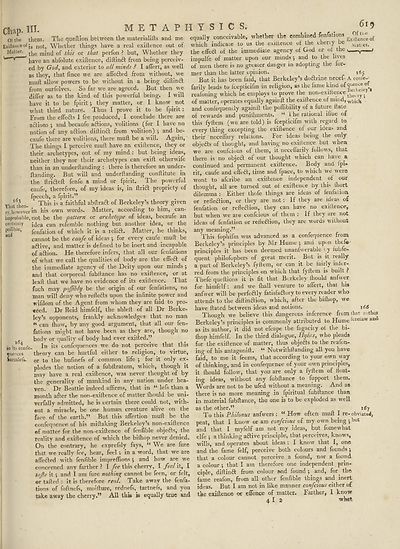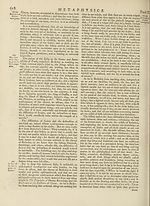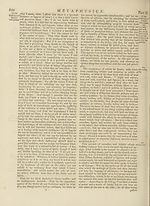Encyclopaedia Britannica, or, a Dictionary of arts, sciences, and miscellaneous literature : enlarged and improved. Illustrated with nearly six hundred engravings > Volume 13, MAT-MIC
(665) Page 619
Download files
Complete book:
Individual page:
Thumbnail gallery: Grid view | List view

Chap. in.
Oi the them. The queflion between the materialifts and me
Exiftence of js not? Whether things have a real exiftence out ot
Matter. ^ mjnj 0f this or that perfon ? but, Whether they
^ • have an abfolute exiftence, diftinft from being perceiv¬
ed by God, and exterior to all minds ? I aflert, as well
as they, that fince we are affe&ed from without, we
muft allow powers to be without in a being diftinft
from ourfelves. So far we are agreed. But then we
differ as to the kind of this powerful being. I will
have it to be fpirit *, they matter, or I know not
what third nature. Thus I prove it to be fpirit :
From the effe&s I fee produced, I conclude there are
actions 5 and becaufe actions, volitions (for I have no
notion of any aftion diftindt from volition) j and be¬
caufe there are volitions, there muft be a will. Again,
The things I perceive muft have an exiftence, they or
their archetypes, out of my mind : but being ideas,
neither they nor their archetypes can exift otherwife
than in an underftanding : there is therefore an under-
ftanding. But wall and underftanding conftitute in
the ft r idle ft fenfe a mind or fpirit. The powerful
caufe, therefore, of my ideas is, in ftri£t propriety of
fpeech, a fpirit.”
That theo- This is a abftracl of Berkeley’s theory given
ry,'however in his own words. Matter, according to him, can-
improbable, not be the pattern or archctijpe of ideas, becaufe an
certainly }jca can rfcfemble nothing but another idea, or the
^T1’510’ fenfation of which it is a lelift. Matter, he thinks,
cannot be the caufe of ideas •, for every caufe muft be
aftive, and matter is defined to be inert and incapable
of aftion. He therefore infers, that all our fenfations
of what we call the qualities of body are the effeft of
the immediate agency of the Deity upon our minds •,
and that corporeal fubftance has no exiftence, or at
leaft that we have no evidence of its exiftence. 1 hat
fuch may pofjibly be the origin of our fenfations, no
man will deny who refle&s upon the infinite power and
wufdom of the Agent from whom they are faid to pro¬
ceed. Dr Reid himfelf, the ableit of all Dr Berke¬
ley’s opponents, frankly acknowledges that no man
“ can (how, by any good argument, that all our fen¬
fations might not have been as they are, though no
body or quality of body had ever exiited.”
in it* confe- lts confequences we do not perceive that, this
Iuenc.s theory can be hurtful either to religion, to virtue,
arralef*. or to the bufinefs of common life j for it only ex¬
plodes the notion of a fubftratum, which, though it
may have a real exiftence, was never thought of by
the generality of mankind in any nation under hea¬
ven. Dr Beattie indeed affirms, that in “ lefs than a
month after the non-exiftence of matter ffiould be uni-
verfally admitted, he is certain there could not, with¬
out a miracle, be one human creature alive on the
face of the earth.” But this affertion muft be the
confequence of his miftaking Berkeley’s non-exiftence
of matter for the non-exiftence of fenlible objedls, the
reality and exiftence of which the biffiop never denied.
On the contrary, he exprefsly fays, “ We are fure
that w'e really fee, hear, feel ; in a word, that we are
affedfted with fenfible impreffions; and how are we
concerned any farther ? I fee this cherry, I feelxt, I
tafe it *, and I am fure nothing cannot be feen, or felt,
or tailed : it is therefore real. Take away the fenfa¬
tions of foftnefs, raoifture, rednefs, tartnefs, and you
take away the cherry.” All this is equally true and
equally conceivable, whether the combined fenfations
which indicate to us the exiitence of the cheny be Vj.lt,er-
the effedt of the immediate agency ot God or ot the <
impulfe of matter upon our minds •, and to the lives
of men there is no greater danger in adopting the for¬
mer than the latter opinion. _ 165
But it has been laid, that Berkeley’s dodlrine nccef- A confer
farily leads to fcepticifm in religion, as the fame kind of quence^
reafoning which he employs to prove the non-exiftence
of matter, operates equally agamit the exiftence ot mind,
and eonfequemly againft the poffibility of a future ftate
of rewards and punithments. 1 he rational iiiue of
this fyftem (we are told) is fcepticifm with regard to
every thing excepting the exiftence of our idea* and
their neceffary relations. For ideas being the only
objedts of thought, and having no exiitence but when
we are confeious of them, it neceffarily follows, that
there is no objedt of our thought which can have .a
continued and permanent exiftence. Body and fpi¬
rit, caufe and effedt, time and fpace, to which we were
wont to aferibe an exiftence independent oi our
thought, all are turned out ot exiftence by this ihort
dilemma : Either thofe things are ideas of lenfation
or refledtion, or they are not : If they are ideas of
fenfation or refledtion, they can have no exiitence,
but rvhen Ave are confeious of them : If they are not
ideas of fenfation or refleftion, they are words without
any meaning.”
This fophifm was advanced as a confequence from
Berkeley’s principles by Mr Hume j and upon thtf©
principles it has been deemed unanfwerable t.y iubfe-
quent philofophers of great merit. But is it really
a part of Berkeley’s fyftem, or can it be fairly inter¬
red from the principles on which that fyftem is built ?
Thefe queftions it is fit that Berkeley ffiould anfwer
for himfelf; and we (hall venture to affert, that lus
anfwer will be perfeflly fatisfadlory to every reader who
attends to the diftindtion, which, after the bifliop, we
have ftated between ideas and notions. irttf
Though we believe this dangerous inference from that authoF
Berkeley’s principles is commonly attributed to Hume forelaw awl
as its author, it did not efcape the fagacity oi the bi¬
ffiop himfelf. In the third dialogue, llylos, who pleads
for the exiftence of matter, thus objedfs to the reafon¬
ing of his antagonift. “ Notwithftanding all you have
faid, to me it' feems, that according to your own way
of thinking, and in confequence of your own principles,
it ftiould follow, that you are only a fyftem of float¬
ing ideas, without any fubftance to fupport them.
Words are not to be ufed without a meaning. And as
there is no more meaning in fpiritual fubftance than
in material fubftance, the one is to be exploded as well
as the other.” iffy
To this Philonus anfwers : “ How often muft I re- obviate*,
peat, that I know or am confeious of my own being 5 but
and that I myfelf am not my ideas, but fomewhat
elfe ; a thinking aftive principle, that perceives, knows,
wills, and operates about ideas : I know that I, one
and the fame felf, perceive both colours and founds j
that a colour cannot perceive a found, nor a found
a colour ; that I am therefore one independent prin¬
ciple, diftindl from colour and found •, and, for. the
lame reafon, from all other fenfible things and inert
ideas. But I am not in like manner confeious either of
the exiftence oc effence of matter, farther, I know
4 I 2 what
METAPHYSICS.
Oi the them. The queflion between the materialifts and me
Exiftence of js not? Whether things have a real exiftence out ot
Matter. ^ mjnj 0f this or that perfon ? but, Whether they
^ • have an abfolute exiftence, diftinft from being perceiv¬
ed by God, and exterior to all minds ? I aflert, as well
as they, that fince we are affe&ed from without, we
muft allow powers to be without in a being diftinft
from ourfelves. So far we are agreed. But then we
differ as to the kind of this powerful being. I will
have it to be fpirit *, they matter, or I know not
what third nature. Thus I prove it to be fpirit :
From the effe&s I fee produced, I conclude there are
actions 5 and becaufe actions, volitions (for I have no
notion of any aftion diftindt from volition) j and be¬
caufe there are volitions, there muft be a will. Again,
The things I perceive muft have an exiftence, they or
their archetypes, out of my mind : but being ideas,
neither they nor their archetypes can exift otherwife
than in an underftanding : there is therefore an under-
ftanding. But wall and underftanding conftitute in
the ft r idle ft fenfe a mind or fpirit. The powerful
caufe, therefore, of my ideas is, in ftri£t propriety of
fpeech, a fpirit.”
That theo- This is a abftracl of Berkeley’s theory given
ry,'however in his own words. Matter, according to him, can-
improbable, not be the pattern or archctijpe of ideas, becaufe an
certainly }jca can rfcfemble nothing but another idea, or the
^T1’510’ fenfation of which it is a lelift. Matter, he thinks,
cannot be the caufe of ideas •, for every caufe muft be
aftive, and matter is defined to be inert and incapable
of aftion. He therefore infers, that all our fenfations
of what we call the qualities of body are the effeft of
the immediate agency of the Deity upon our minds •,
and that corporeal fubftance has no exiftence, or at
leaft that we have no evidence of its exiftence. 1 hat
fuch may pofjibly be the origin of our fenfations, no
man will deny who refle&s upon the infinite power and
wufdom of the Agent from whom they are faid to pro¬
ceed. Dr Reid himfelf, the ableit of all Dr Berke¬
ley’s opponents, frankly acknowledges that no man
“ can (how, by any good argument, that all our fen¬
fations might not have been as they are, though no
body or quality of body had ever exiited.”
in it* confe- lts confequences we do not perceive that, this
Iuenc.s theory can be hurtful either to religion, to virtue,
arralef*. or to the bufinefs of common life j for it only ex¬
plodes the notion of a fubftratum, which, though it
may have a real exiftence, was never thought of by
the generality of mankind in any nation under hea¬
ven. Dr Beattie indeed affirms, that in “ lefs than a
month after the non-exiftence of matter ffiould be uni-
verfally admitted, he is certain there could not, with¬
out a miracle, be one human creature alive on the
face of the earth.” But this affertion muft be the
confequence of his miftaking Berkeley’s non-exiftence
of matter for the non-exiftence of fenlible objedls, the
reality and exiftence of which the biffiop never denied.
On the contrary, he exprefsly fays, “ We are fure
that w'e really fee, hear, feel ; in a word, that we are
affedfted with fenfible impreffions; and how are we
concerned any farther ? I fee this cherry, I feelxt, I
tafe it *, and I am fure nothing cannot be feen, or felt,
or tailed : it is therefore real. Take away the fenfa¬
tions of foftnefs, raoifture, rednefs, tartnefs, and you
take away the cherry.” All this is equally true and
equally conceivable, whether the combined fenfations
which indicate to us the exiitence of the cheny be Vj.lt,er-
the effedt of the immediate agency ot God or ot the <
impulfe of matter upon our minds •, and to the lives
of men there is no greater danger in adopting the for¬
mer than the latter opinion. _ 165
But it has been laid, that Berkeley’s dodlrine nccef- A confer
farily leads to fcepticifm in religion, as the fame kind of quence^
reafoning which he employs to prove the non-exiftence
of matter, operates equally agamit the exiftence ot mind,
and eonfequemly againft the poffibility of a future ftate
of rewards and punithments. 1 he rational iiiue of
this fyftem (we are told) is fcepticifm with regard to
every thing excepting the exiftence of our idea* and
their neceffary relations. For ideas being the only
objedts of thought, and having no exiitence but when
we are confeious of them, it neceffarily follows, that
there is no objedt of our thought which can have .a
continued and permanent exiftence. Body and fpi¬
rit, caufe and effedt, time and fpace, to which we were
wont to aferibe an exiftence independent oi our
thought, all are turned out ot exiftence by this ihort
dilemma : Either thofe things are ideas of lenfation
or refledtion, or they are not : If they are ideas of
fenfation or refledtion, they can have no exiitence,
but rvhen Ave are confeious of them : If they are not
ideas of fenfation or refleftion, they are words without
any meaning.”
This fophifm was advanced as a confequence from
Berkeley’s principles by Mr Hume j and upon thtf©
principles it has been deemed unanfwerable t.y iubfe-
quent philofophers of great merit. But is it really
a part of Berkeley’s fyftem, or can it be fairly inter¬
red from the principles on which that fyftem is built ?
Thefe queftions it is fit that Berkeley ffiould anfwer
for himfelf; and we (hall venture to affert, that lus
anfwer will be perfeflly fatisfadlory to every reader who
attends to the diftindtion, which, after the bifliop, we
have ftated between ideas and notions. irttf
Though we believe this dangerous inference from that authoF
Berkeley’s principles is commonly attributed to Hume forelaw awl
as its author, it did not efcape the fagacity oi the bi¬
ffiop himfelf. In the third dialogue, llylos, who pleads
for the exiftence of matter, thus objedfs to the reafon¬
ing of his antagonift. “ Notwithftanding all you have
faid, to me it' feems, that according to your own way
of thinking, and in confequence of your own principles,
it ftiould follow, that you are only a fyftem of float¬
ing ideas, without any fubftance to fupport them.
Words are not to be ufed without a meaning. And as
there is no more meaning in fpiritual fubftance than
in material fubftance, the one is to be exploded as well
as the other.” iffy
To this Philonus anfwers : “ How often muft I re- obviate*,
peat, that I know or am confeious of my own being 5 but
and that I myfelf am not my ideas, but fomewhat
elfe ; a thinking aftive principle, that perceives, knows,
wills, and operates about ideas : I know that I, one
and the fame felf, perceive both colours and founds j
that a colour cannot perceive a found, nor a found
a colour ; that I am therefore one independent prin¬
ciple, diftindl from colour and found •, and, for. the
lame reafon, from all other fenfible things and inert
ideas. But I am not in like manner confeious either of
the exiftence oc effence of matter, farther, I know
4 I 2 what
METAPHYSICS.
Set display mode to:
![]() Universal Viewer |
Universal Viewer | ![]() Mirador |
Large image | Transcription
Mirador |
Large image | Transcription
Images and transcriptions on this page, including medium image downloads, may be used under the Creative Commons Attribution 4.0 International Licence unless otherwise stated. ![]()
| Permanent URL | https://digital.nls.uk/192692691 |
|---|
| Attribution and copyright: |
|
|---|
| Description | Ten editions of 'Encyclopaedia Britannica', issued from 1768-1903, in 231 volumes. Originally issued in 100 weekly parts (3 volumes) between 1768 and 1771 by publishers: Colin Macfarquhar and Andrew Bell (Edinburgh); editor: William Smellie: engraver: Andrew Bell. Expanded editions in the 19th century featured more volumes and contributions from leading experts in their fields. Managed and published in Edinburgh up to the 9th edition (25 volumes, from 1875-1889); the 10th edition (1902-1903) re-issued the 9th edition, with 11 supplementary volumes. |
|---|---|
| Additional NLS resources: |
|

